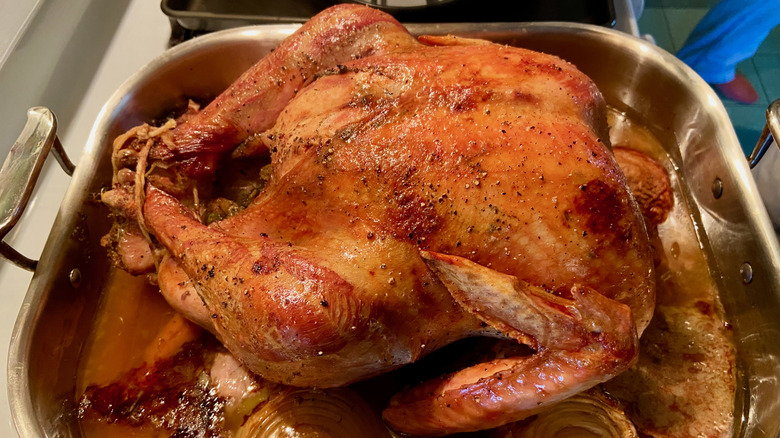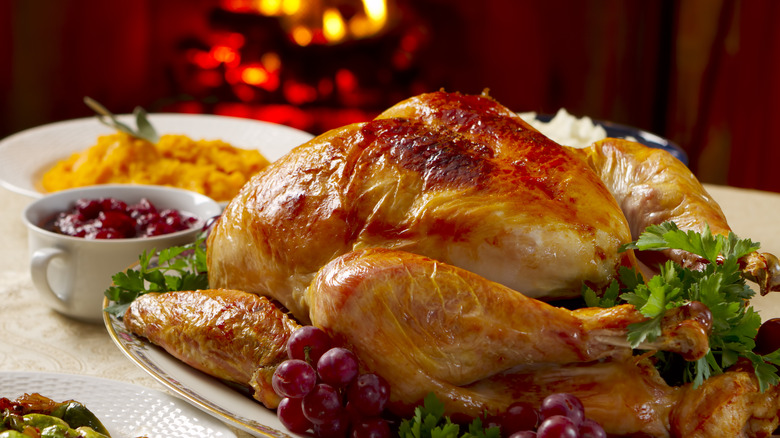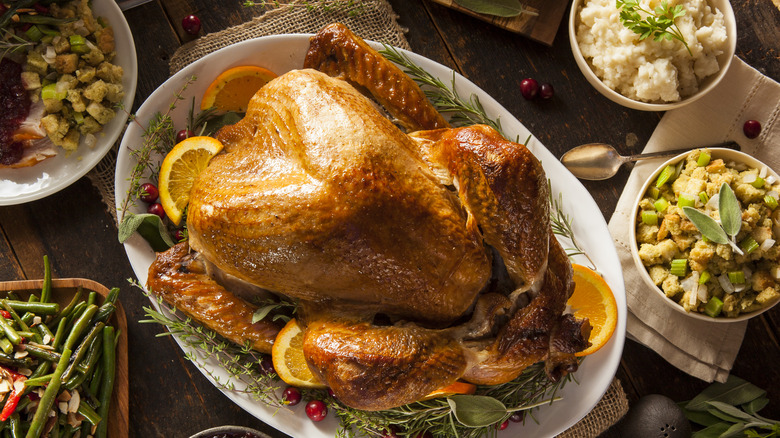The Easy Tip For Preventing Your Turkey Wings From Burning
While it may seem simple enough, it can be a bit more complicated than it first appears to make a perfect roasted turkey. In particular, the wings of the bird are often overlooked in lieu of heartier offerings like the thighs, legs, or breast. However, you shouldn't forget about this part of the turkey when prepping for that Thanksgiving feast or big weekend dinner. Otherwise, you may be leaving a lot of meat on the table, and every bit counts — especially if you have a large family.
One particular risk of cooking a whole turkey is that your wings will end up a bit overdone. The last thing you want is for them to end up rubbery and tough to chew. However, there's an easy hack to prevent accidentally burning your wings to cinders. All you'll need is a bit of aluminum foil from your cabinet. Simply wrap your wings in a sheet of foil before you pop that bird in the oven. You won't need much, as you'll just be covering the tips of the wings. The foil will provide a protective barrier from the heat of the oven, meaning your wings won't overcook as a result.
Why the foil hack works
Given the large size of turkeys, home cooks run the risk of accidentally overcooking or undercooking parts of the bird. This is due to the potential for turkey to cook unevenly as a result of its proportions. Typically, white meat cooks faster than dark meat. This puts wings in a delicate position since they are generally thinner than the turkey's breast and also cook faster than the thighs and legs.
Aluminum foil works well to mitigate the risk of overcooking your turkey wings because it helps insulate the meat against the heat of the oven. As any homeowner knows, aluminum foil makes for a good insulator, meaning it repels heat. Some people use the material to line their attics. When it comes to food, aluminum foil is often used to lock in the heat of freshly cooked food, but it can also be used to protect against heat during the cooking process. It's the same reason some bakers use aluminum foil to protect the crusts of their pies.
Additionally, aluminum foil can withstand temperatures up to 400 degrees Fahrenheit, making it perfect for your turkey, since they're generally roasted at a lower temperature for a longer period of time.
Other tips for juicy tender wings
While the aluminum foil hack can help protect your wings from burning, you might want to consider combining it with other tips for juicier, more tender turkey wings. To make sure that everything cooks evenly, consider trussing your bird prior to baking. Loop a piece of twine or rope (make sure it's the kind made for cooking) through the wings and legs, drawing them closer to the body of the turkey. This allows the outer extremities — namely the wings and legs — to cook at a similar rate as the body of the turkey.
You should do this step before applying the tin foil to your wings. Likewise, you should also consider adding some butter to the mix as well. Not only will this prevent your turkey breast from drying out, but it can also have a similar effect on the wings. Take the butter and apply it directly under the skin of the wings. Just be careful not to accidentally break one off when applying. The fat in the butter will provide another protective barrier for the meat, giving additional moisture and natural grease that the wings otherwise lack. Follow these tips in conjunction with the aluminum foil trick for turkey wings that fall off the bone. You could also try removing the wings and barbecuing them if you prefer.


